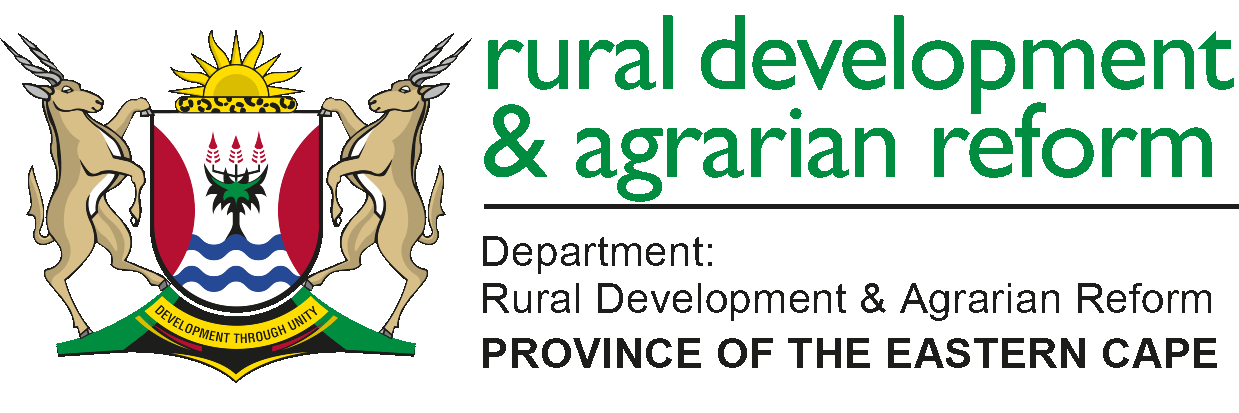
AGRICULTURE INTERVENTIONS TO COMBAT COVID – 19
The Eastern Cape Department of Rural Development and Agrarian Reform (DRDAR) is supporting the Department of Health (DoH) during the outbreak of Covid-19 by providing six mobile veterinary clinics to increase the field screening capacity.
This was announced by DRDAR MEC Nomakhosazana Meth during a press briefing held at the Bhisho Massacre Memorial Centre where Premier Lubabalo Mabuyane with some MECs were updating the media about the status Covid-19 in the province.
Meth added that the department has also made available on loan basis to the National Health Laboratory Service (NHLS), through DoH, three (3) Ribonucleic Acid (RNA) extractors and Polymerase Chain Reaction (PCR) “machine” (amplifier) to augment the existing provincial capacity for laboratory testing.
Apart from the support to DoH, the MEC also reported on the COVID-19 Disaster Agricultural Support Fund, COVID-19 Disaster Agricultural Support Fund to PLAS farms, COVID-19 Disaster Agricultural Support Fund to commercial farmers, DRDAR COVID-19 Household Food Security Programme and DRDAR COVID-19 Disaster Agricultural Support to commercial farmers
The COVID-19 Disaster Agricultural Support Fund (CDASF) was announced by the minister of Agriculture, Land Reform and Rural Development Thoko Didiza with of R1, 2 billion to cushion off farmers and households to continue food supply from the negative impact resulting from the pandemic across the country.
MEC Meth said DRDAR officials assisted farmers with the application process and received applications through all local and District offices.
From 23 April 2020, DRDAR offices registered 9885 forms that were hand delivered and 723 applications were lodged on line which gave a total submission of 10 608.
She said all the applications are currently being screened at district offices where DRDAR and the National DARDLR is represented and adjudication at provincial level is going to be concluded on May 8.
On the COVID-19 Disaster Agricultural Support Fund to land reform beneficiaries, which also Minister Didiza’s initiative aimed at ensuring food security whilst the country grapples with the COVID-19 pandemic, MEC said seven farms were identified.
“These farms were identified prior to the COVID-19 disaster and as such the support will be provided in terms of their original assessment and related production inputs, key infrastructure including water provision and water board fees,” she said, adding that the assessments of the specific needs of the farm has a budget of R 63.4m.
She added that farmers on Proactive Land, Acquisition Strategy (PLAS) farms will benefit in the R400m of the R1.2 billion that was allocated in line with the former DRDLR Stimulus Package.
She said there was also COVID-19 Disaster Agricultural Support Fund to commercial farmers, which is allocated an amount of R100million nationally and will be administered by the Land Bank.
Meth announced that DRDAR has established COVID-19 Household Food Security Programme, which has a budget of R20 million.
The MEC said this program will support the vulnerable household with the production needs that include vegetable production inputs, fertilizer, provision of free-range indigenous chicken’s production pack that include 6 hens and one rooster as well as yellow maize and stress packs.
She added that DRDAR working with sister departments will provide households with hand sanitizers face masks and hand gloves whilst households with no access to water will be supported with water harvesting equipment that will ensure availability of water for backyard gardens
Meth said the National department has provided the province with PPE’s that are being distributed to the farm workers and target hotspots.
The MEC said 40 000 masks and 44 000 bar soaps had been delivered to the province for distribution to farm workers and DRDAR is currently procuring 20 000 cloth masks and 20 000 gloves.
DRDAR, through its Dohne Agricultural Development Institute in collaboration with Rhodes University has produced 1 300 litres of sanitizers, which were packaged in 500 ml.
“The institution is currently producing 300 litres per day and the plan is to increase to 1000 per day. This initiative will benefit the surrounding communities, agriculture value chain facilities and rural communities’,” Meth said.
The Tsolo Agriculture and Rural Development Institute is also producing cloth mask to support the surrounding communities with the production expected to increase to reach 10 000 over a next two months.
“The departmental continuity plan responds to the current issue that farmers are experiencing, to this effect farmers and officials were issued with movement permits for easy access to markets.
“The departmental support to the farming community through supply of PPE is ongoing and commercial farmers in Sarah Baartman and Amathole were visited for inspection and distribution.
“The technical units of the department had been visible in the communities doing scouting and treatment of African and Fall Army worms, as well as animal health related outbreaks,” the MEC concluded.

